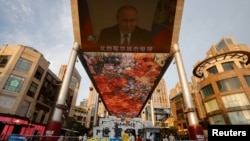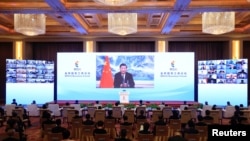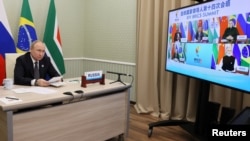Ukraine: It was a word barely mentioned but often alluded to as the leaders of Brazil, Russia, India, China and South Africa — collectively known as BRICS — gave their opening remarks at a virtual summit Thursday hosted by Beijing.
In his address, Chinese President Xi Jinping said the group’s purpose was to “make the world a more stable place” and “speak out for equity and justice.” He then appeared to take aim at the West, though the U.S. was never referred to by name.
“We must abandon cold war mentality and bloc confrontation and oppose unilateral sanctions and the abuse of sanctions,” the president of the world’s second-largest economy said in apparent reference to U.S. and European Union sanctions against Moscow.
Of the BRICS member states — emerging economies that position themselves as an alternative to the U.S.-led liberal world order — only Brazil voted against Russia’s invasion of Ukraine at the United Nations earlier this year. China, India and South Africa all abstained from condemning the invasion.
Xi’s remarks Wednesday at the BRICS business forum ahead of the main summit were even less equivocal.
“We in the international community should reject zero-sum games and jointly oppose hegemony and power politics,” he said.
Avoid 'spillovers'
“Major developed countries should adopt responsible economic policies and avoid negative policy spillovers that may take a heavy toll on developing countries. It has been proved time and again that sanctions are a boomerang and a double-edged sword,” he added.
Unlike the others, Xi did refer directly to Ukraine, saying: “The combination of the COVID-19 pandemic and the Ukraine crisis has resulted in disruptions to global industrial and supply chains … and emerging markets and developing countries bear the brunt.”
For his part, Russia leader Vladimir Putin on Thursday thanked Xi and “all our Chinese friends” and took aim at the “selfish actions of certain states” that he said had thrown the global economy into a crisis, referring to sanctions against his government.
Countries in the global South have been hard hit by food insecurity and rising oil prices caused by the Ukraine crisis, and Putin noted that Russia could “count on the support of many Asian, African and Latin American states striving to pursue an independent policy.”
On Wednesday at the business forum, Putin said Russia was actively “redirecting its trade flows” and increasing oil deliveries to India and China. Brazilian President Jair Bolsonaro said that instead of closing itself off in the face of disrupted supply chains, Brazil would be seeking to “deepen our economic integration.”
South Africa, one of the democracies in BRICS, has been widely criticized for taking a neutral stance on the Ukraine conflict. At the Thursday summit, President Cyril Ramaphosa was less strident than other leaders.
“In line with our foreign policy principles, South Africa continues to call for dialogue and negotiation toward a peaceful resolution of conflicts around the world,” he said.
Different views
Later, a joint declaration by the group was vague, underscoring the different countries' divergent views on the matter.
"We have discussed the situation in Ukraine and recall our national positions as expressed at the appropriate fora, namely the UNSC [U.N. Security Council] and UNGA [U.N. General Assembly]. We support talks between Russia and Ukraine" the statement said, adding that BRICS supported U.N. humanitarian assistance to the region.
Not all the talks focused on the Ukraine crisis, however, with leaders, including Xi and Indian Prime Minister Narendra Modi, also stressing the need to enhance international cooperation in the fight against COVID-19.
On this matter, Ramaphosa took aim at the West for not adhering to “the principles of solidarity and cooperation when it comes to equitable access to vaccines.”
“We call on developed economies, international agencies and philanthropists that procure vaccines to purchase from manufacturers in developing economies, including in Africa,” he said.
Despite aiming to present a united front against the U.S. and its allies, BRICS member states also have disagreements among themselves, though those do not necessarily stop their cooperation. Bolsonaro has previously made anti-China statements, while India has challenged Beijing on its disputed Ladakh border.
On Wednesday, ahead of the BRICS summit, China's Foreign Minister Wang Yi met with India’s ambassador to China, Pradeep Kumar Rawat. In the ministry’s summary of the meeting, Beijing stated the two countries should continue to look for “solutions through dialogue and consultation” on the “boundary issue” and that “common interests between China and India far outweigh the differences.”
BRICS expansion
Additionally, China has supported the expansion of BRICS to include other countries. “Bringing in fresh blood will inject new vitality into BRICS cooperation and increase the representativeness and influence of BRICS,” said Xi in his remarks at the summit.
China’s Wang said that “to strengthen the solidarity and cooperation between emerging markets and developing countries,” for the first time, officials and foreign ministers of Argentina, Egypt, Indonesia, Kazakhstan, Nigeria, the United Arab Emirates, Saudi Arabia, Senegal, and Thailand, described as BRICS Plus countries, were invited to a May virtual meeting of BRICS foreign ministers.
The BRICS joint statement declared the countries were in favor of further discussions about expanding bloc membership but “stressed the need to clarify” the details of the process.






